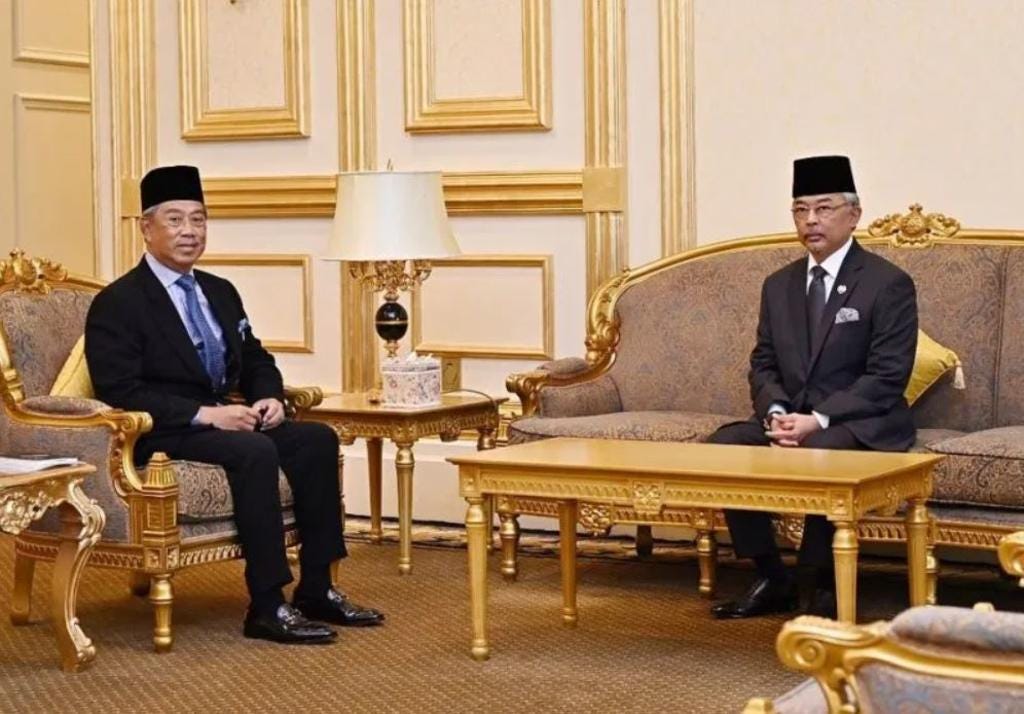[ad_1]

Malaysian Prime Minister Muhyiddin Yassin, his razor-thin majority collapsing, today (Jan. 12) introduced a state of emergency in parliament ostensibly to combat the Covid-19 pandemic, delaying parliamentary sittings and elections until August 1 and forestalling efforts by the opposition to remove him from power. The emergency decree was agreed by the Yang d-Pertuan Agong, or king, Sultan Abdullah Shah of Pahang, on Monday evening, sources in Kuala Lumpur said, to be delivered the next day.
The crisis appears to have been precipitated by expectations of a coming collapse of support within Muhyiddin’s Perikatan Nasional coalition as much as by the pandemic. Indeed, three members of parliament from the United Malays National Organization later announced after the emergency ruling that they had withdrawn their support, leaving him with only 109 votes. He needs 112 to stay in power.
Muhyiddin, who had been asking the palace for an emergency decree since last October, denied the move was designed to end parliamentary democracy, telling reporters that “The civilian government will continue to function.” Although he said that borders will be tightened and the army will assist police and immigration officials in detaining migrants attempting to cross the country’s porous borders, “the emergency proclaimed by the King is not a military coup and curfews will not be enforced.”
At 139,992 cases, Malaysia has far fewer than either Indonesia, with 828,026, or the Philippines, with 487,684 although it did suffer 2,433 cases overnight – still far fewer than Indonesia, with 9,640. No other country in Southeast Asia has sought to declare a state of emergency despite the fact that coronavirus cases have been spiking across the region, adding to suspicions that political considerations were playing a greater role in Muhyiddin’s decision than public health ones.
According to the palace, the Agong granted Muhyiddin’s request for a Declaration of Emergency Proclamation although the ruling stipulated that if daily cases can be brought under control, the emergency ruling would be lifted. The ruling eliminates any chance of a general or state election and by-elections to fill empty seats. The Agong’s decision can’t be reversed, giving Muhyiddin nearly eight months to try to engineer the reconstruction of his coalition, which looks problematical at best. In an effort to stay in power, he has already created the biggest cabinet in Malaysian history, handing out patronage to almost anybody who would deliver loyalty. To those he couldn’t shoehorn into the bulging cabinet, he delivered titles in as many government-linked companies as possible.
Along with opposition parties, Asean Parliamentarians for Human Rights expressed alarm over the decision, saying in a written statement that “Given the political instability Malaysia has faced since Prime Minister Muhyiddin came to power through a back-door government in March 2020, the decision to suspend parliament raises serious concerns that his government is intent on avoiding parliamentary scrutiny. “
Muhyiddin took power in a political vacuum in March after the collapse of the Pakatan Harapan government headed by then-Prime Minister Mahathir Mohamad, leading a shaky coalition that depended on the unreliable support of UMNO, whose leader, Ahmad Zahid Hamidi remains president despite facing 88 charges of corruption, and Parti Islam se-Malaysia, has reliably been accused of accepting RM90 million (US$18.2 million) in bribes to align with UMNO in the 2018 general election. That support now appears to have collapsed.
The country has been in political upheaval in the past year, with opposition leader Anwar Ibrahim, the head of Parti Keadilan Rakyat, and Mahathir attempting to bring him down, among others. Muhyiddin barely survived a vote on the budget in December after weeks of delay. Fitch, the rating agency, downgraded Malaysian debt from A- to BBB+ amid growing public anger following the budget votes. Although Muhyiddin committed to holding a general election as soon as the Covid-19 crisis was under control, skeptics pointed out that the ailing 73-year-old premier has been playing rope-a-dope for months in his struggle to stay in power.
Cabinet, state executive councils, and government services are to continue to function as usual, Muhyiddin told reporters, and the king would make the necessary decrees to tackle the pandemic, including ordering private healthcare facilities to be taken over by the government if public hospitals are stretched.
“Sultan Abdullah advises the public to remain calm, resilient and (to) persevere in facing the emergency and movement control order (MCO) for our own safety and interest,” said Comptroller of the Royal Household of Istana Negara Ahmad Fadil Shamsuddin in a statement on Tuesday, referring to movement restrictions to curb surging Covid-19 cases.
Malaysia had largely escaped serious damage from the coronavirus until October, when the disease began to spread rapidly during elections in the East Malaysian state of Sabah. It apparently jumped back to the mainland with the arrival of election workers and the pandemic has been slowly eating into the population since.
Local media reported that Muhyiddin announced that several states will be put under stringent movement controls starting on Wednesday to curb rising coronavirus infections. Johor, Melaka, Selangor, Penang, Sabah and the federal territories of Kuala Lumpur, Putrajaya and Labuan will be under the MCO until Jan 26. Three districts in Sarawak – Kuching, Miri and Sibu – as well as Pahang, Perak, Negri Sembilan, Kedah, Terengganu and Kelantan will be under the conditional MCO, which bans social gatherings.
This article is among the stories we choose to make widely available. If you wish to get the full Asia Sentinel experience and access more exclusive content, please do subscribe to us.
[ad_2]
Source link